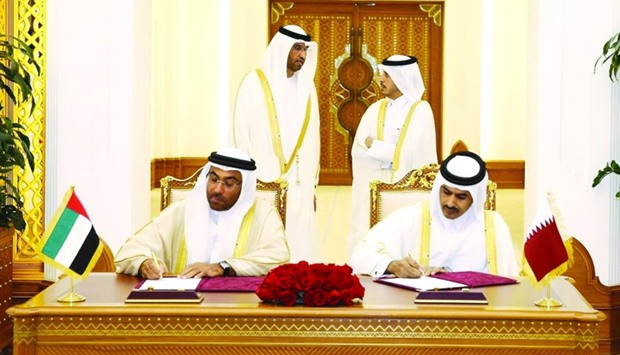In this regard, QP and Dolphin have entered into a new long-term gas sale and purchase agreement (SPA), a spokesman for Qatar's hydrocarbons behemoth said, without divulging the quantity of gas to be supplied.
The supply of the additional gas through the existing 48-inch subsea pipeline, under this new agreement, will be allocated to Sharjah Electricity and Water Authority and Ras Al Khaimah Gas using the existing UAE Eastern Gas Distribution System (EGDS).
The EGDS, along with the Taweelah Receiving Facility and the Taweelah-Fujairah Pipeline, ensures the receipt and distribution of natural gas from Dolphin Energy's gas processing plant in Ras Laffan, Qatar, to its customers across the UAE and Oman, in a safe and reliable manner.
The agreement was reached and signed in the framework of the brotherly relations and cooperation between Qatar and the UAE and in line with the goals set by both countries to expand areas of cooperation and pursue of mutually beneficial opportunities between them in all fields, especially in the field of energy.
The SPA was signed yesterday in Doha by Saad Sherida al-Kaabi, president and chief executive of QP; and Ahmed Ali al-Sayegh, managing director of Dolphin, in the presence of HE the Prime Minister and Minister of Interior Sheikh Abdullah bin Nasser bin Khalifa al-Thani and the UAE Minister of State and chief executive of Abu Dhabi National Oil Company Dr Sultan bin Ahmed al-Jaber.
Al-Kaabi described the agreement as another important achievement for the first cross-border gas pipeline project in the Middle East demonstrating Qatar’s continued commitment to regional energy cooperation.
“This agreement reinforces confidence in Qatar as a reliable regional and international supplier of gas as a clean energy source.” he said, stressing QP’s commitment to meeting the UAE’s rising demand for gas.
"These developments help support the UAE’s development and transition to a low carbon economy and demonstrate our continued commitment to enhance energy security for the UAE by offering a source of reliable, clean energy for power generation," al-Sayegh said.
Highlighting that the success of the Dolphin Gas project is, in part, driven by its ability to meet the needs of customers, he said as their requirements have changed, so it has also responded accordingly and worked closely with its strategic partner, QP, to make this possible.
Dolphin started gas supply to the UAE in July 2007 and in February 2008, achieved full throughput of 2bn standard cubic feet (scf) per day and been delivering the gas to the UAE and Oman. It is meeting 30% of the UAE’s energy requirements and delivering significant volumes of natural gas to each of the country’s seven emirates.
Dolphin Energy's customers include Abu Dhabi Water and Electricity Company, which receives an average 994mn scf of gas per day; Dubai Supply Authority (730mn scf); and Oman Oil Company (200mn scf), according to its website.
Last year, the company upgraded its compression facilities and installed three new export gas compressors at its gas processing plant in Ras Laffan to match its export gas pipeline’s supply capacity of 3.2bn scf per day.

Al-Kaabi and al-Sayegh signing the new long-term gas sale and purchase agreement in the presence of HE the Prime Minister and Minister of Interior Sheikh Abdullah bin Nasser bin Khalifa al-Thani and the UAE Minister of State and chief executive of Abu Dhabi National Oil Company Dr Sultan bin Ahmed al-Jaber
Qatar Petroleum (QP) will deliver additional quantities of gas to Dolphin for export to the UAE as part of efforts to enhance the bilateral economic cooperation between the two countries.
